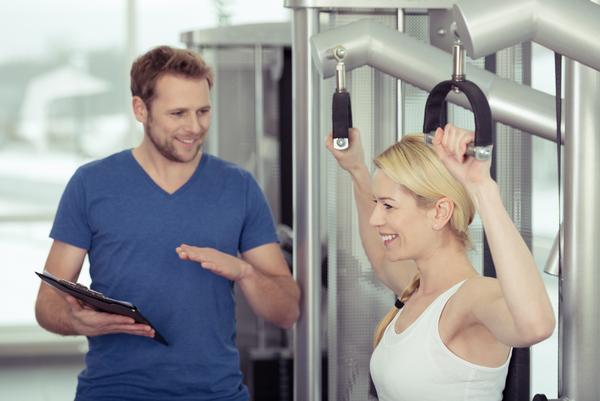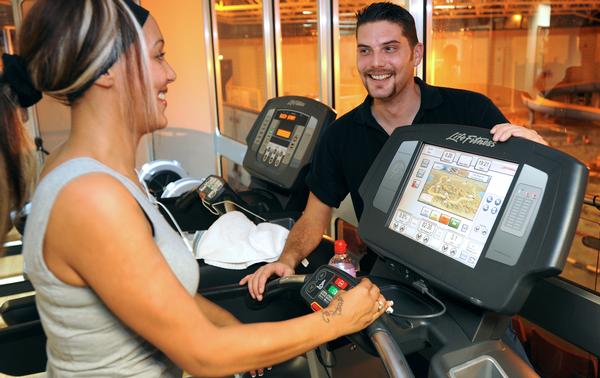
|
 |
Health Club Management Handbook - From the operators

Research round-up

|
|
| From the operators
|

Work experience is viewed as more important than academic qualifications, and secondary spend is a growing focus. Mike Hill reports
Mike Hill, Leisure-net Solutions
|


There’s more focus on customer service in staff training Photo: shutterstock..com/ racorn
|
|
|
The latest UK Fitness Industry Confidence Survey (FICS) made some interesting discoveries – not least that operators feel that work experience is more important than academic qualifications when applying for a job (see the section on ‘FICS Facts’, right). Other key themes are that member retention is still the main challenge for operators – but more positively there’s also an increased focus on customer service, customer experience and retention within staff training. Staff numbers are on the up too: 37 per cent of respondents believe they will employ more people in 12 months’ time than they do now.Meanwhile, social media is now recognised as by far the most significant opportunity to improve health and fitness operators’ position in the market. We speak to a selection of industry experts for their views on this year’s FICS findings.
|
|

|
FICS FACTS

Confidence in the sector as a whole is higher: 34% of respondents feel more confident and 49% feel the same as three months ago. But only 27% are more confident about the future of their own business

47% of respondents say work experience is the most important thing when applying for a job; 15% say academic qualifications; 18% say volunteering
24% are more confident about their primary income stream, although most (59%) feel the same; confidence in secondary income is growing for 20%
65% say competition for their business has increased over the last three months
27% of operators say they are already committed to recruiting apprentices, while 45% are considering it
37% believe they will employ more staff in 12 months’ time than they do now
A willingness and aptitude to have a go at everything, alongside customer service and soft skills, are seen as the most important skills new staff can have
Major challenges facing the health and sector are seen as member retention, the economy and staff costs
Customer retention, customer service and industry knowledge are seen as key areas for further staff training and development
Social media is seen as by far the biggest opportunity to improve operators’ position in the market (32%), followed by online advertising (17%) and PR (15%)
|
 |

Karen Burrell
Sales and Marketing Director
Freedom Leisure
 |
47 per cent of respondents said work experience was the most important attribute a school leaver could have when applying for a job, compared to just 15 per cent saying academic qualifications. A further 18 per cent said volunteering
The leisure sector attracts people with a range of qualifications and experience. At entry level, no specific qualifications are required: the most important quality an applicant can have is the confidence and personality to work with customers of all types and ages to ensure they leave having had a positive experience.
We offer many work experience opportunities to students at local schools, colleges and universities and, while the student’s age determines the level of their programme, they’re offered experience across all activities in our facilities, including reception, management, gym, catering and cleaning.
The transition from school to the working world can be difficult, and work experience – particularly in a customer service environment – can really help young people to start their careers with more confidence.
In the leisure industry, there are many paths to progression that require further training, such as fitness, lifeguarding and sports coaching. A good operator will have a training plan in place to help staff to achieve their goals. After all, well-trained and enthusiastic staff are key to success in our industry; academic qualifications don’t necessarily indicate the best candidates.
| |


|

Well-trained, enthusiastic staff are key to the sector’s success |
|
|
 |

Nigel Wallace
Client services director
Lifetime Training
 |
27 per cent of operators are already committed to recruiting apprentices and 45 per cent are considering it. But while 62 per cent of organisations know how
to recruit an apprentice, 42 per cent are unsure
how to implement a scheme
You’d have to have been on the moon to have missed the focus that’s been placed on apprenticeships of late. The government views them as a key driver of skills and business growth, and is now aiming to deliver three million more apprenticeships in its second term of office. This is a huge commitment on the part of the government, and one that’s built on the proven understanding that apprentices are good for business.
The active leisure sector is already drawing on this benefit, so it’s surprising to learn that almost half of operators are still unsure how to implement an apprenticeship scheme. From our perspective it couldn’t be more straightforward. Operators literally outline the training needed to support any area of their business and we, as a training provider, offer the options and steps to getting started. If recruitment is required we also take that on, so the whole process can be fully supported and, in many cases, fully funded.
This survey found work experience to be more important than academic qualifications, which reinforces why apprenticeships are so highly prized. The training is on-the-job, embedding the knowledge and skills alongside performing the role. This approach to employing potential and moulding to the position fits the way business operates.
| |


|

The government sees apprenticeships as a key driver
of skills and business growth |
|
|
 |

Kevin Yates
Director
1Rebel
 |
Confidence in secondary income is growing for
20 per cent of respondents, although most
(63 per cent) feel the same
Back in the day, secondary spend was much harder because it was all given away at the point of sale. But if you give things away for free they have zero value, so a T-shirt will be worn when decorating the house and not offer you any brand value. Most operators have now reduced the amount they give away. If they haven’t, they should.
In budget clubs, everything is secondary spend – even the padlocks – which is a great business model. Think Pure Gym’s vending machines. It’s all there if you want it. Leisure Connection – where I worked previously – also did superbly well on its secondary spend, but it was mostly impulse purchases like arm bands and goggles. That’s right for its market though.
However, for the boutique sector it has to be things people really want, rather than things they really need. It’s all about brand value.
A staggering 12 per cent of SoulCycle’s revenue is from secondary spend – that’s a massive amount from £1bn-valued business. Everyone has bought into the brand and they want to be seen wearing the SoulCycle clothing.
At 1Rebel, our aim is to make it cool to buy a 1Rebel top, cool to have a 1Rebel keyring, cool to drink from 1Rebel-branded bottles of water. Every item has to be an experience.
We sell thousands of boxing wraps for our Rumble classes every week and even featured on the catwalk at London Fashion Week, where a model used the wraps as a belt. This doesn’t happen without brand identity and brand value.
Secondary spend is a very important part of our business, but it should be a key indicator for any business. Even a small club can turn over thousands of pounds a month on shakes if it gets it right.
"Secondary spend is a very important part of our business… but this doesn’t happen without brand identity and brand value"
| |


|

Boutique operator 1Rebel aims to make it cool and desirable for customers to buy its branded merchandise |
|
|
 |

27 per cent of operators say they are more confident about the future of their individual businesses than they were three months ago |
 |
Martin Guyton
CEO
tmactive
I’m not sure whether the fitness industry as a whole feels bullish, but the opportunities presenting themselves through increased understanding of the beneficial impact of physical activity are, I believe, there to be taken advantage of.
I certainly feel confident about the future in terms of our own business. We’ve seen some resurgence in casual swimming and fitness memberships continue to grow. We’re growing our resources too, for example creating a co-ordinator post to oversee our health and wellbeing strategy: developing programmes and partnerships and seeking grant aid where possible. We’re also looking at business development options, including wearable technology and virtual exercise, to help engage with new and existing customers both inside and outside of our facilities.
The biggest challenges we face, in common with many in the sector, are recruitment and growth in staff costs.
I’m an advocate of the professional development framework being implemented by CIMSPA, and am seeking to introduce an apprenticeship programme within the business too. I also believe that, while we’re currently enjoying lower energy costs, we need to be mindful of long-term price rises in this area.
| |


|
| PHOTO: SHUTTERSTOCK.COM/Mila Supinskaya |

Operators should look at growth areas like wearables and virtual exercise |
|
|
Mike Hill is director of insight specialist Leisure-net Solutions, which carried out the FICS research in collaboration with Leisure Industry Week (LIW) and Lifetime Training. The survey was completed by 143 senior managers and directors of health club operations across the UK: 58 per cent public sector and 42 per cent private sector.
For more information: [email protected]
|
|
 |
| Originally published in HCM Handbook 2016 edition
|
|
 |
|
|
